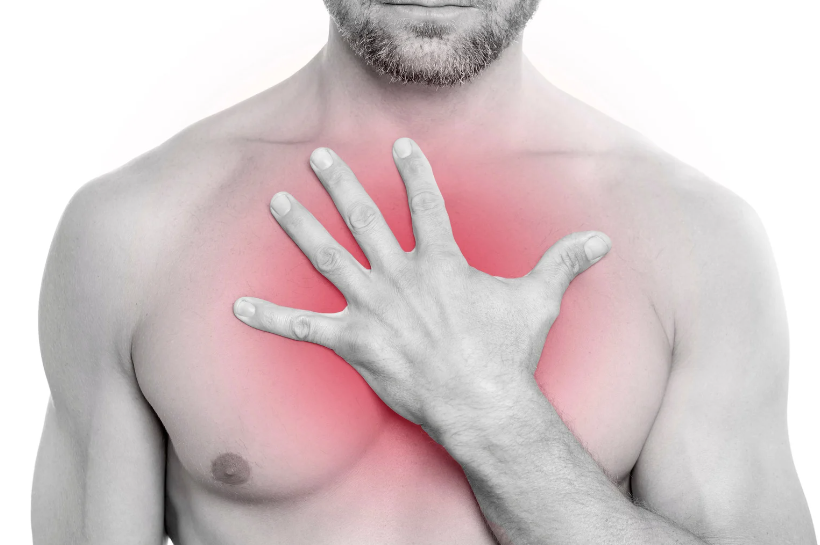Health Conditions
Can Gas Really Cause Chest Pain
Gas is a natural byproduct of digestion and can build up in the digestive tract, causing feelings of bloating, pressure, and sometimes even chest pain.
Are you experiencing sharp or dull chest pain that seems to come and go? Before jumping to any conclusions, it’s important to consider whether gas could be the culprit behind your discomfort. Understanding the relationship between gas and chest pain is essential to managing your symptoms effectively.
In this article, we’ll explore the connection between gas and chest pain, discussing the potential causes, symptoms, and remedies to alleviate the discomfort. Whether you’re dealing with occasional bloating or recurrent chest pain, this information will help you gain a better understanding of your condition and aid in seeking appropriate medical advice.
Don’t let chest pain leave you feeling bewildered and anxious; educate yourself and take control of your health. Read on to discover everything you need to know about gas and its potential role in causing chest pain.
Gas and Its Impact on the Body
Gas is a natural part of the digestion process. When we eat or drink, we swallow air along with the food or liquid. This air might become stuck in the digestive system, causing discomfort. Furthermore, as food is digested in the stomach and intestines, gases such as carbon dioxide, methane, and hydrogen are released. These gasses can also cause bloating and discomfort.
The human body has numerous systems for releasing excess gas. Burping and releasing gas through the rectum are natural ways for the body to release stored gas. However, there are situations when the gas is not evacuated as quickly, causing an accumulation in the digestive tract. This accumulation of gas can result in pressure, bloating, and, in some circumstances, chest pain.
Excessive gas can be caused by a number of things, including swallowing air while eating or drinking, consuming gas-producing foods like beans or cabbage, and having certain medical illnesses like irritable bowel syndrome (IBS) or lactose intolerance. Understanding the effects of gas on the body is critical for establishing whether it is the root cause of your chest pain.

What is Chest Pain and Its Common Causes
Chest pain is a frequent symptom with a wide range of reasons, from minor to severe. It is characterized as a sharp, dull, or burning sensation in the chest that may spread to other parts of the body, such as the arms, neck, or jaw. Chest discomfort might indicate a serious medical problem, such as a heart attack or angina, but it can also be caused by something less serious, such as muscle strain, acid reflux, or gas.
When establishing the etiology of chest discomfort, several aspects must be considered, including the location, duration, and any concomitant symptoms. Gas-related chest pain is sometimes accompanied with a sensation of bloating or pressure in the chest, which might be mistaken for a more serious ailment. It’s critical to understand the most prevalent reasons of chest pain, as well as how gas can contribute.
The Link Between Gas and Chest Pain
Gas-related chest pain arises when gas accumulates in the digestive tract, putting pressure on the surrounding organs, such as the diaphragm and heart. The diaphragm is a muscle that separates the chest and abdominal cavities and is essential for breathing. When too much gas presses on the diaphragm, it can cause discomfort and chest pain.
The heart’s proximity to the digestive system makes it susceptible to the effects of gas. The pressure from gas can irritate the nerves in the chest, causing pain. In certain situations, gas-induced chest pain might mirror the symptoms of a heart attack, generating undue fear and confusion.
It is crucial to remember that, while gas can produce chest pain, it is rarely cause for alarm on its own. However, if you have severe or persistent chest pain, you should seek medical assistance to rule out any significant underlying causes.

Symptoms of Gas-Related Chest Pain
Gas-related chest pain can present in a variety of ways, depending on the individual. Some common symptoms are:
- A feeling of pressure or fullness in the chest
- Sharp or stabbing pain in the chest that comes and goes
- Discomfort that worsens with certain movements or positions
- Belching or passing gas
- Bloating or a visibly distended abdomen
It’s crucial to note that these symptoms differ from person to person, and not everyone will experience them all. Gas-related chest pain might often be accompanied by other digestive symptoms such bloating, indigestion, or changes in bowel motions.
Keeping a diary of your symptoms will help you determine whether your chest pain is caused by gas. Take note of when the pain happens, what you were eating or doing at the time, and any other pertinent information. This information can help your healthcare professional make an accurate diagnosis.
Diagnosing Gas-Related Chest Pain
Gas-related chest pain can be difficult to diagnose because other possible explanations must be ruled out. Your healthcare professional will most likely start by taking a complete medical history and performing a physical examination. They may inquire about your symptoms, lifestyle, and nutritional preferences. It is critical to supply as much information as possible to aid the diagnosis procedure.
In some circumstances, additional testing may be required to confirm the diagnosis. These tests may include:
- X-rays and ultrasounds are imaging procedures used to see the digestive tract and rule out other disorders.
- Monitoring the esophageal pH to determine the existence of acid reflux, which can cause chest pain.
- Gastrointestinal motility tests examine how well the digestive system functions.
These tests can help identify any underlying issues that may be contributing to your chest pain. It’s essential to work closely with your healthcare provider to ensure an accurate diagnosis and appropriate treatment plan.

Home Remedies for Gas Relief and Chest Pain Management
If gas is determined to be the cause of your chest pain, there are several home remedies and lifestyle changes that can help provide relief. Here are some strategies to consider:
- Avoid gas-producing foods: Certain foods, such as beans, lentils, broccoli, and carbonated beverages, can contribute to excess gas. Limiting or avoiding these foods may help reduce symptoms.
- Eat smaller, more frequent meals: Overeating can put additional pressure on the digestive system and lead to gas buildup. Opt for smaller, more frequent meals to promote better digestion.
- Slow down while eating: Eating too quickly can cause you to swallow excess air, leading to gas. Take your time and chew your food thoroughly to aid in digestion.
- Stay hydrated: Drinking plenty of water can help prevent constipation, which can contribute to gas and bloating.
- Exercise regularly: Physical activity can help stimulate digestion and promote the release of trapped gas. Incorporate regular exercise into your routine to support a healthy digestive system.
These home remedies can provide temporary relief and help manage gas-related chest pain. However, if your symptoms persist or worsen, it’s important to seek medical advice.
When to Seek Medical Attention for Gas-Related Chest Pain
While gas-related chest pain is typically harmless, there are instances when it may indicate a more serious condition. It’s important to seek immediate medical attention if you experience any of the following symptoms:
- Severe or persistent chest pain
- Chest pain accompanied by shortness of breath, dizziness, or fainting
- Chest pain that radiates to the arms, neck, jaw, or back
- Chest pain that worsens with physical activity or exertion
- Chest pain that is accompanied by nausea, vomiting, or sweating
These symptoms could be indicative of a heart attack or another serious cardiac condition. It’s crucial not to ignore these warning signs and to seek medical attention promptly.

Prevention and Lifestyle Changes to Reduce Gas and Chest Pain
Prevention is key when it comes to managing gas-related chest pain. By implementing certain lifestyle changes, you can reduce the likelihood of experiencing discomfort. Here are some strategies to consider:
- To avoid swallowing too much air, eat slowly and thoroughly.
- Avoid fizzy drinks and gas-producing foods.
- Maintain a healthy weight, as extra weight can put strain on the digestive system.
- Manage your stress levels, as stress can cause digestive difficulties and flatulence.
- Stay active and include regular exercise in your regimen to promote good digestion.
By adopting these preventive measures, you can proactively manage gas and reduce the occurrence of chest pain.
Conclusion
Gas-related chest pain is frequent and can be extremely uncomfortable. Understanding the link between gas and chest discomfort allows you to better manage your symptoms and seek medical attention if needed. Remember to listen to your body’s cues and keep track of your symptoms so you can provide accurate information to your healthcare professional.
Making lifestyle adjustments and using home remedies can bring comfort and help prevent future bouts of gas-related chest pain. Taking care of your digestive health is critical for overall well-being, so be proactive in managing your symptoms and get help as required.
Trusted Health, Wellness, and Medical advice for your well-being



